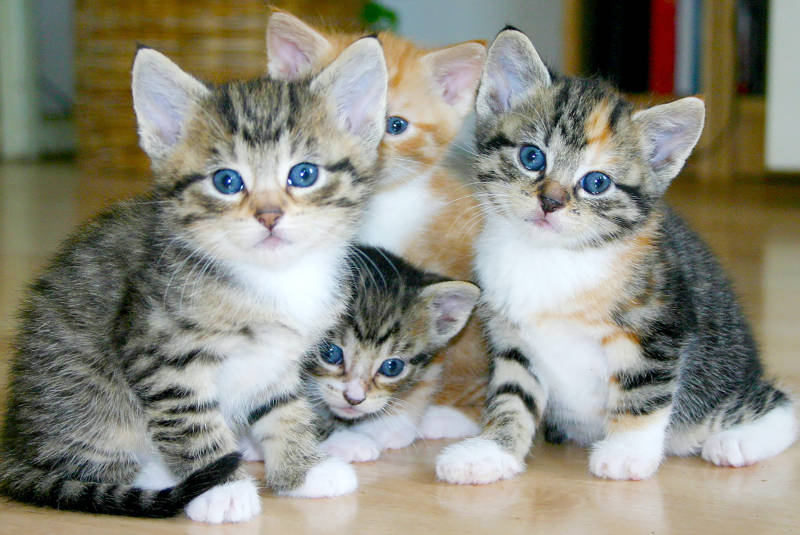Feline breeding season, adorably nicknamed ‘kitten season’, is the time of the year when the weather begins to warm and feral cats begin birthing litters. Female cats tend to go into heat as the weather warms, and are much less likely to do so during the winter.
During kitten season, which typically runs between April and September, local animal shelters experience the bulk of their kitten intake for the year. While an influx of kittens is an adorable problem to have, it puts a heavy burden on the already strained resources of community animal rescues and shelters.
Feral cats live in colonies throughout our community, and without human intervention those colonies can grow at alarming rates. To give you an idea of how quickly cat colonies can multiply, consider this: one healthy pair of breeding cats, including their offspring (and their offspring, and so on) can produce over 11,000 cats in just five years – and over two million cats in eight years!
It is estimated that there are between 1.5 – 4.1 million feral cats in Canada. When it comes to rescue and re-homing, cats living in feral colonies typically do not make good candidates for adoption; they are much better off remaining feral.
Thankfully, there are ways to help reduce the feral cat population in our community.
Catch and Release
The Georgian Triangle Humane Society (GTHS) runs a wildly successful program called ‘Community Cats’ for feral colony cats. This program offers free spay/neuter services for feral cats, and volunteers can schedule these services directly with the GTHS. Humane live traps are available for loan to those willing to trap local feral cats.
Once surgery is complete, the cats are then returned to the wild, where they can live out their days without reproducing further.
Female cats can conceive as young as four months of age, meaning they can have litters in the same season they were born. The Community Cats program can have a substantial positive impact on reducing the feral cat population in our community, however it relies heavily on volunteers and continuous support from the community to make it possible.
Fostering
When young kittens come into the care of local rescues and shelters, they sometimes do so without living mothers. Or, the mother may be unable to care for her kittens for a variety of reasons. Sometimes, other mothers may take the kittens in, but that isn’t always a reality.
This is where volunteer foster parents shine. Fostering very young kittens is an admirable undertaking as they are unable to adequately care for themselves. Care includes hand feeding every few hours, helping the kittens go to the bathroom, and more.
With older kittens who are weaned from their mother and simply waiting for adoption, temporary foster homes are often needed to provide care until they find their forever families.
Food & Formula Donations
Kittens under four weeks of age are too young for solid food. They require a special type of kitten formula, and the costs of providing enough formula to meet the needs of young kittens can add up fast. Recently, the GTHS put out a call for help on their social media platforms asking for donations of cat food and kitten formula, and it was met with overwhelming response from the community.
This time of year, consider donating cat food and kitten formula to shelters and rescues to help with the influx of tiny mouths to feed.
Donation of Time, Money & Supplies
Aside from food, other supplies can make a big difference to animal rescues and shelters, including blankets, cat litter, litter boxes, and more. Reach out to your local rescue or shelter and ask them what supplies they need most urgently.
Of course, monetary donations are always welcome as well. The majority of animal rescues and shelters are operating solely on donations from supporters. Without incoming funds, shelters are unable to keep their doors open and their lights on. Moreover, many animal shelters are run entirely by volunteers, who come in every day to clean litter boxes, feed kitties, scrub floors, do administrative tasks, and much more.
As you can see, there are many ways to volunteer this time of year to help alleviate the stress of kitten season in local shelters and rescues. If you would like to make a donation, Canadian Pet Connection accepts donations of food, money, and supplies for local shelters year round.
Brandon Forder, known as The Pet Expert, is vice-president of Canadian Pet Connection, an industry leader in healthy pet lifestyles. Brandon is certified in pet nutrition, and has more than twenty-five years’ experience specializing in pet health and behaviour. He has written hundreds of informative pet-related articles for newspapers, magazines, radio, and the popular Ask the Pet Expert Blog. Brandon is highly skilled in pet problem solving, and enjoys teaching others about smart and responsible pet ownership. To learn more, visit www.CanadianPetConnection.ca.












